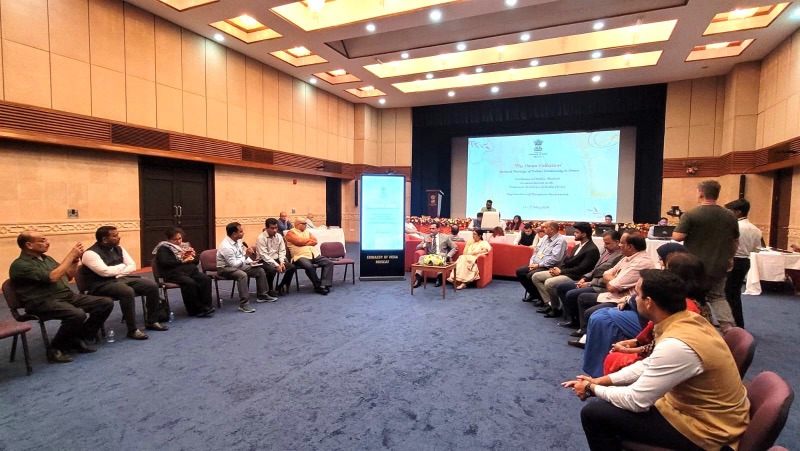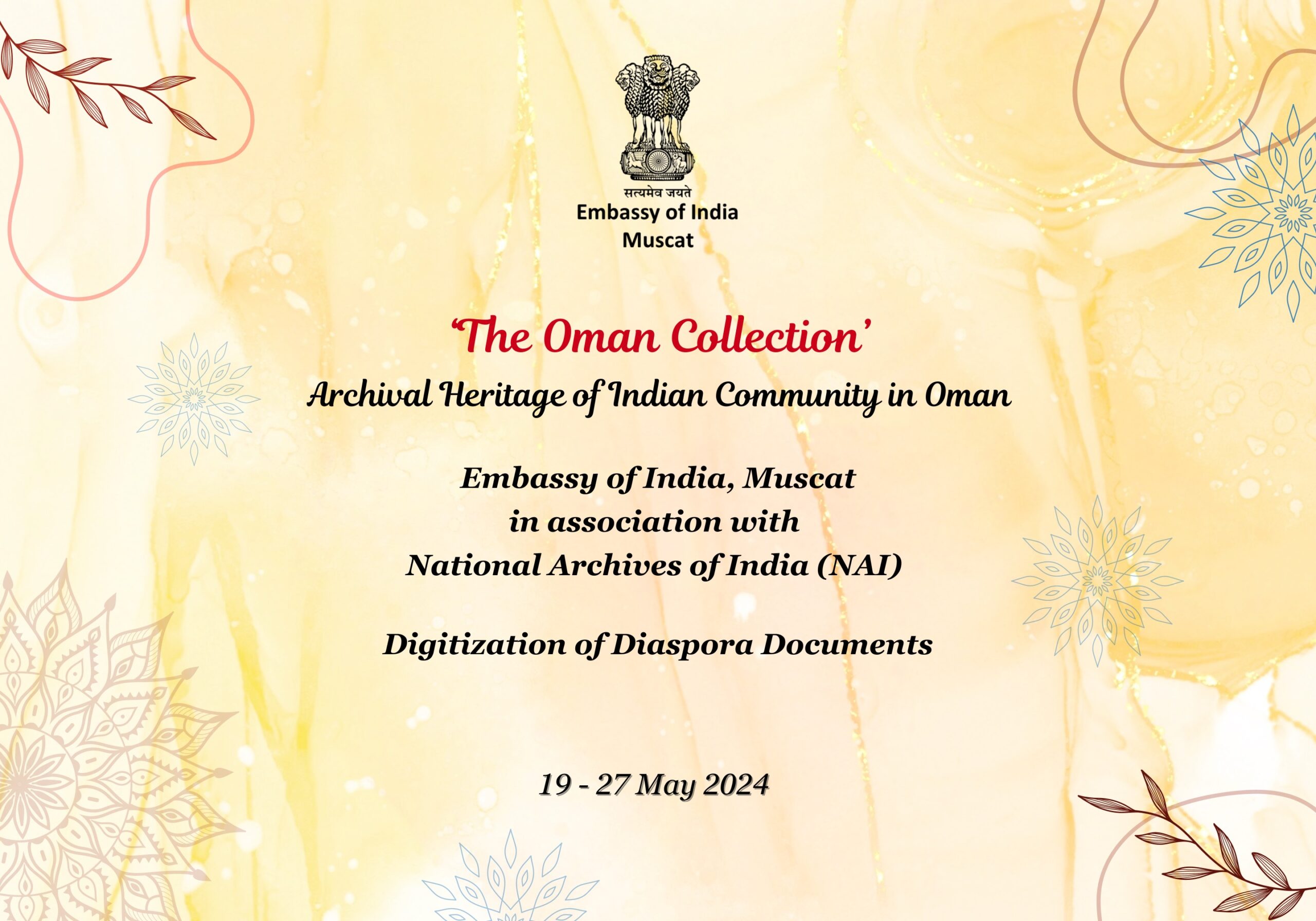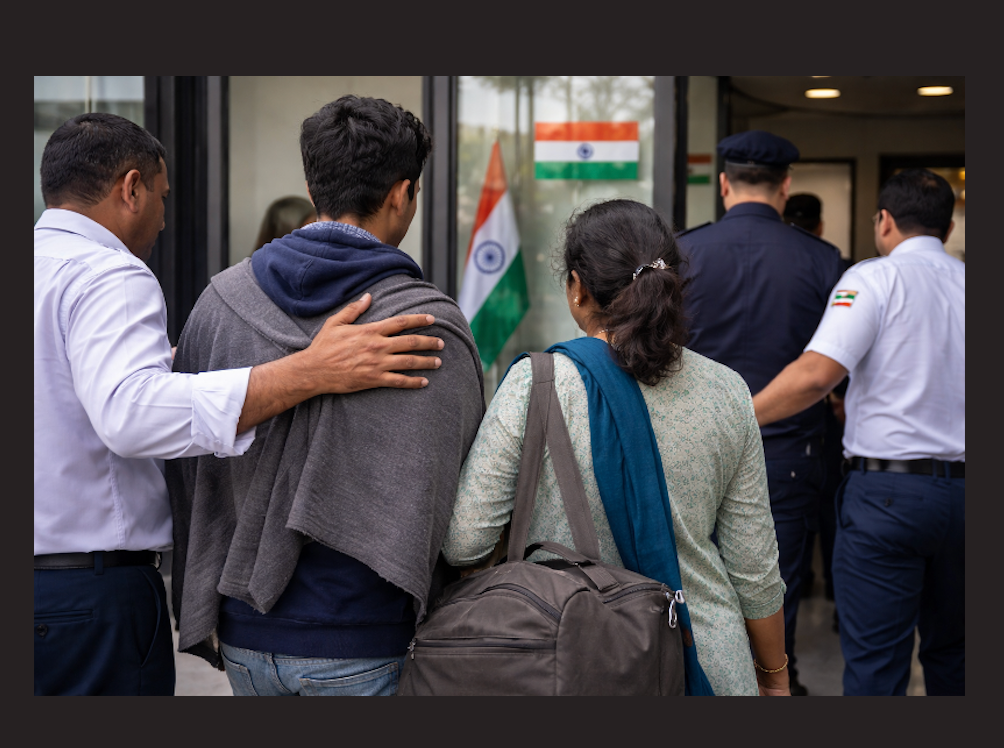These documents include personal diaries, account books, ledgers, telegrams, trade invoices, passports, citations, letters, correspondences, and photographs, providing a fascinating insight into the lives and contributions of the Indian community in Oman.
The Embassy of India in Muscat, in collaboration with the National Archives of India (NAI), has successfully completed a groundbreaking initiative to digitize historical documents of the Indian diaspora in Oman. This pioneering project, titled ‘The Oman Collection – Archival Heritage of the Indian Community in Oman,’ took place from May 19-27, 2024, at the Embassy of India premises in Muscat. It saw enthusiastic participation from 32 prominent Indian families from Gujarat, whose presence in Oman dates back 250 years.
Significance of the Project
This initiative marks the NAI’s first overseas project aimed at digitizing and archiving diaspora documents, signifying an important step in preserving the heritage and history of the Indian community abroad.
The Indian Community in Oman
Oman hosts nearly 700,000 Indians, with historical and cultural ties between India and Oman dating back 5000 years. Merchant families from Mandvi, Surat, and other parts of Gujarat have resided in Sur, Muttrah, and Muscat since the late 18th century, becoming integral parts of Omani society while maintaining strong connections with India.
Record Number of Documents Digitized
Under this project, over 7000 documents in English, Arabic, Gujarati, and Hindi from the private collections of old Indian merchant families were scanned and digitized. The oldest document dates back to 1838, with the majority from the late 19th and early 20th centuries. These documents include personal diaries, account books, ledgers, telegrams, trade invoices, passports, citations, letters, correspondences, and photographs, providing a fascinating insight into the lives and contributions of the Indian community in Oman.
Participating Families
The digitized documents come from the private collections of the following families:
Ratansi Purshotam family
Khimji Ramdas family
Haridas Nensey family
Bhanji Haridas Mundrawalla family
Naraindas and Shanta Toprani family
Maganlal Manji Vyas family
Vijay Singh Veljee Pawani family
Lakhoo’s Ved family
Chimanlal Chhotalal Surti family
Jayantilal Wadher family
Kanojia family
Ramesh Khimji family
Visoomal Damodardas family
Vijay Singh Purshotam Toprani family
Jamnadas Keshavji family
Naranjee Hirjee family
Velji Arjun Pawani family
Purshotam Damodar family
Pandya family
Meghji Nenshi family
Shah Nagardas Manji family
Ajit Khimji family
Khatau Ratansi Toprani family
Ratanshi Gordhandas Bajaria family
Harshendu Hasmukh Shah family
Khubo Gurnani family
Mohanlal Arjun Pawani family
Dhanji Moraji “Shabica” family
Ebji Sundardas Asher
Dharamsey Nensey
Kiran Asher family
Bakul Mehta family

ORAL HISTORIES RECORDED
The project also recorded oral histories from older members of the Indian community, capturing personal anecdotes, migration experiences, and the community’s evolution in Oman. This is the NAI’s first oral history project involving the diaspora.
Remarks from Key Figures
Shri Arun Singhal, Director General of the National Archives of India, remarked, “This is the first time we have collected and digitized private diaspora archives from abroad. This marks a historic milestone for the NAI and a significant step towards preserving the rich heritage of the diverse overseas Indian community.”
Amit Narang, Ambassador of India to Oman, noted, “This project aligns with Prime Minister Shri Narendra Modi Ji’s vision to strengthen connections with the Indian diaspora worldwide. By documenting and preserving the history of the Indian community in Oman, we are rekindling a vital part of our shared heritage.”
Sheikh Anil Khimji, head of the Indian community in Oman, expressed gratitude for the project, appreciating Prime Minister Modi and External Affairs Minister Dr. S. Jaishankar’s vision for engaging with the diaspora.
Support and Future Prospects
The initiative was supported by the National Records and Archives Authority (NRAA) of Oman, which provided logistical support, ensuring smooth execution. This digitization project not only preserves historical records but also aims to foster deeper engagement with the Indian diaspora in Oman, promoting appreciation of the longstanding India-Oman friendship. It will also serve as a valuable resource for future generations and researchers.
The digitized documents will be archived and made available on ‘Abhilekh Patal,’ the NAI’s digital portal, accessible to researchers and the public.
***********************************************************
Readers
These are extraordinary times. All of us have to rely on high-impact, trustworthy journalism. And this is especially true of the Indian Diaspora. Members of the Indian community overseas cannot be fed with inaccurate news.
Pravasi Samwad is a venture that has no shareholders. It is the result of an impassioned initiative of a handful of Indian journalists spread around the world. We have taken a small step forward with the pledge to provide news with accuracy, free from political and commercial influence. Our aim is to keep you, our readers, informed about developments at ‘home’ and across the world that affect you.
Please help us to keep our journalism independent and free.
In these difficult times, running a news website requires finances. While every contribution, big or small, will make a difference, we request our readers to put us in touch with advertisers worldwide. It will be a great help.
For more information: pravasisamwad00@gmail.com








